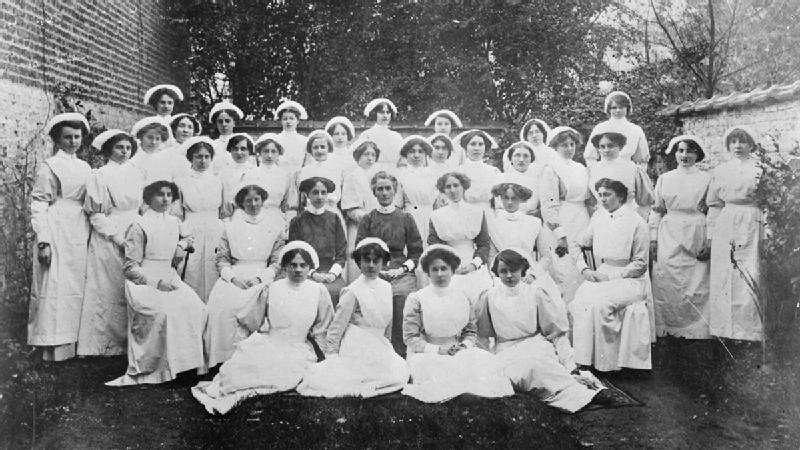
An artist depicts a German officer firing the coup de grâce after nurse Edith Cavell faced the firing squad in October 1915.
[Public domain]
Edith Cavell has often been referred to as the other Florence Nightingale, the equivalent of the famed nurse and social reformer known as the founder of modern nursing. Still, Cavell did more than just carry the torch of Nightingale’s social reforms; she was a luminary in her own right, establishing the foundation of nursing education and a key figure in aiding the escape of up to 1,000 Allied soldiers from Belgium during the First World War. She was executed for helping the Allies on Oct. 12, 1915, which galvanized western countries such as Canada into honouring her legacy.
Born on Dec. 4, 1865, in Norfolk, England, Cavell was nurtured as much by the rich meaning of her vicar father’s sermons as she was by her family’s loving nature.
“She grew up learning about truth, dedication, the love of God and humanity,” wrote nurse and author Terri Arthur in the May 2020 The Online Journal of Issues in Nursing. “Right and wrong were well defined.”
With women’s career aspirations limited, Cavell became a tutor for a French-speaking family in Brussels—until her father became critically ill and she returned home. At 30, she found her true calling: nursing.
At 30, she found her true calling: nursing.
Trained at the London Hospital, Cavell sought to embody the tenets of Nightingale’s Notes on Nursing. Her uncompromising dedication to the trade after her graduation was recognized when a surgeon invited her to train nurses in Belgium.
She arrived to dilapidated facilities, a lack of students, religious fanaticism and a haughty boss. But after seven years of perseverance, Cavell’s enterprise was overseeing nurses in three hospitals, three private nursing homes, 24 communal schools, 13 private kindergartens and a clinic in addition to private work.
“Cavell created a new career path for women in Belgium, elevating their status [to professional],” wrote Arthur.

Edith Cavell (seated centre) with a multinational group of nursing students in Belgium.
[Imperial War Museums/Wikimedia]
The First World War, however, tested the profession to its core, with most nurses fleeing Belgium when thousands of German soldiers began marching into the country in August 1914. With Cavell’s school closed under the harsh mandates of German rule, she joined the Red Cross to care for wounded soldiers.
But the moral right she had learned in the English countryside was pushed to its limits when two wounded British soldiers arrived at her clinic begging for help in mid-September 1914. Though the Germans were clear that aiding the enemy in any capacity warranted death, wartime policy wasn’t about to rewrite Cavell’s ethical principles. She took them in.
A member of the Belgian resistance subsequently asked her if she could aid Allied soldiers in escaping to the Netherlands. So, for nine months, Cavell became an important link in shepherding hundreds to safety. The scheme met its end, however, during a raid on Cavell’s clinic when a German officer spotted a thank-you note from a British soldier. She was arrested and taken to St. Giles Prison.
“The Germans soon learned that executing Cavell was the worst mistake they had made in this war.”
Wanting to send a clear message that they were not to be undermined, the Germans sentenced Cavell to death in a three-minute trial. The next morning, Oct. 12, 1915, Cavell was shot four times at the Tir National shooting range.
“The Germans soon learned that executing Cavell was the worst mistake they had made in this war,” wrote Arthur.
Using Cavell’s story in recruitment campaigns, many Canadians, Brits and Australians volunteered, armed with a distinctive vengeance.

Mount Edith Cavell near Jasper, Alta., named in honour of the famous WW I nurse.
[Anthonymaw/Wikimedia]
After the war, memorials to Cavell were erected in some 15 countries. No tribute may be as significant as the one in Canada: a 3,300-metre peak near Jasper, Alta., was renamed in her honour—Mount Edith Cavell—in 1916.
Reflecting on the renaming of the mountain in July 1951, the Secretary of the Geographic Board of Alberta wrote: “This outstanding mountain named in honour of such an outstanding heroine, it seemed to remind us that only the real things of life last and are worthwhile.”
Advertisement



















